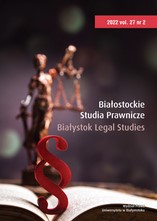Przestępstwo z art. 305 p.w.p. a ograniczenia prawa ochronnego na znak towarowy (w szczególności z powodu tolerowania) – uwagi prawnoporównawcze w kontekście planowanej nowelizacji przepisów p.w.p.
The Offence under Article 305 of the Industrial Property Law and the Limitations of Protection Law for a Trademark (in Particular Due to Tolerance): Comparative Legal Remarks in the Context of the Planned Amendment of the IPL Provisions
Author(s): Marcin TrzebiatowskiSubject(s): Criminal Law, EU-Legislation, Commercial Law, Comparative Law
Published by: Temida 2
Keywords: counterfeit trademark; criminal liability; deregulation; exclusions of protection rights; tolerance of use;
Summary/Abstract: Among the rights that precede rights in the registration of a trademark, Polish law does not take into account the rights to signs acquired as a result of their use in trade. It also does not take into account such rights in regard to excluding the effectiveness of the right from registration due to the tolerance of such rights arising later. Meanwhile, the aforementioned rights are raised not only in cases of infringement of the protection right for a trademark but also in criminal cases concerning a counterfeit trademark (Art. 305 of the Industrial Property Law). In connection with the proposed deregulation of the Industrial Property Law Act, a question arises about the need for a more comprehensive amendment of the relevant provisions. This question also concerns the provisions on criminal liability, namely whether they should not directly – as is the case with the provisions on civil liability – condition the claim for protection of the right to a trademark from its (full) effectiveness in a given case, including in the context of fulfilling the requirement of genuine use of the mark. These questions become all the more justified in the light of the comparison of the above-mentioned legal status with the solutions in this regard in other EU Member States (e.g. in German law) – in terms of the competitive legal position of enterprises using trademarks belonging to them in these countries, respected on the basis of national legislation.
Journal: Białostockie Studia Prawnicze
- Issue Year: 1/2022
- Issue No: 27
- Page Range: 55-73
- Page Count: 19
- Language: Polish

